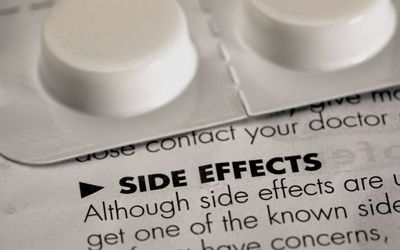IT IS one of the most common and wrenching decisions in mental health: when to stop antidepressant medication.
The big risk of going off the drugs is the possibility of relapse. Those who have had one episode of depression have a 50% chance of having a second. Those who have had two episodes have an 80% chance of having another. Continuing on antidepressant medication can cut the risk of relapse in half, according to a review of 15 clinical trials that was published in the Journal of Clinical Psychiatry in 2014.
But antidepressant medications can come with significant side effects, including weight gain and sexual dysfunction. Some patients complain of flattened emotions. While the most popular drugs, selective serotonin reuptake inhibitors (SSRIs) appear to be very safe, even long-term studies tend to follow people for only a few years.
With many people first diagnosed with depression and anxiety disorders in their 20s and 30s, the prospect of taking medication for decades may not be appealing — especially among those who have been feeling well for years.
Now, researchers are looking for patterns of brain activity or other indicators that might indicate which people are most likely to relapse. Those most at risk might be advised to stay on antidepressants long-term. Scientists are also studying whether certain psychological treatments can prevent relapse after patients go off medication.
More than 303-million prescriptions were filled for antidepressants and mood stabilisers in 2014, according to IMS Health, which tracks pharmaceutical sales. The decision on when to stop medication "is a huge issue for people," says Beth Salcedo, a psychiatrist and medical director of the Ross Center for Anxiety and Related Disorders in Washington DC, US
"One of the biggest problems with people taking antidepressants is they get off prematurely and without their doctor’s supervision. They think their doctor is going to say no."
One study published in the Journal of Affective Disorders in 2009 showed that more than 40% of people with recurrent depression didn’t take the drugs as their doctors had prescribed. Dr Salcedo brings up the topic of how and when to stop antidepressants before she even puts patients on them.
Pablo Campos says that after taking the antidepressant Wellbutrin for depression and anxiety for many years, he stopped the medication about two years ago. "I wanted to be fully healthy without it," says the 27-year-old college student in Florida. "I didn’t want to have to depend on something that wasn’t myself."
He also stopped taking medication for attention-deficit hyperactivity disorder. But Mr Campos, who also struggled with substance abuse as a teenager, did a lot of preparation in advance. In the months leading up to tapering the Wellbutrin, he began to work out regularly, eat healthily and see his therapist more frequently. He says he hasn’t had a relapse of depression since stopping the medication, but still has occasional episodes of feeling down and unmotivated. And he hasn’t ruled out medication in the future: "I know a day might come when I need to get back on," he says.
Studies indicate that antidepressants are more effective at preventing relapse than they are at treating acute depression. SSRIs have long been dogged by data that indicates that they are only slightly more effective than placebos: People with depression tend to get better on both drugs and placebo.
That is largely because depression is a cyclical disease, says Robert Temple, deputy director for clinical science at the Center for Drug Evaluation and Research at the US Food and Drug Administration. "The acute effect (of SSRIs) is modest," Dr Temple says. "You reduce the rate of recurrence. If you believe recurrent depression is bad for patients and dangerous — and we do — that is a big deal."
He notes, however, that the calculus is very different for children and adolescents: They are thought to need long-term treatment with antidepressants much less frequently than adults. The US Food and Drug Administration (FDA) also has a "black-box" warning on SSRIs stating that they may increase the risk of suicidal thoughts and behaviour in some children and adolescents.
Doctors already know that people who have had more than one episode of depression are at great risk of relapse. Also, people who still have some symptoms once they’re in remission, such as sleep disturbances or difficulty concentrating, are also more likely to have another bout of depression.
Researchers are now racing to uncover other differences among patients that could identify those more likely to relapse. One study published in 2015 in the journal Clinical Psychological Science followed 57 women in remission from depression and 103 healthy controls. Women completed a task where they viewed happy, sad, angry and neutral faces.
About 60% of the women who spent the most time viewing the angry faces (as measured by an eye-tracking device on a computer) had a relapse of their depression during the next two years. About 20% of women who spent the least time viewing the angry faces relapsed.
A study published in JAMA Psychiatry in October 2015 followed 75 patients in remission from major depressive disorder for 14 months. At the beginning of the study, participants had their brains scanned while they read certain statements that either elicited feelings of guilt and self-blame, such as "I was stingy toward my best friend", or anger and indignation — "My best friend was stingy toward me."
The connectivity between two brain regions — the subgenual cingulate cortex and right superior anterior temporal cortex — when participants read the self-blaming statements predicted who went on to have a relapse. When that activity was combined with other enhanced connectivity between certain brain regions, the measures predicted relapse with an accuracy of about 75%.
The right superior anterior temporal cortex is believed to be involved in representing social meaning and may be at the root of depressed people’s "tendency to overgeneralise the interpretation of (their) behaviour," says Roland Zahn, a psychiatrist at Kings College London and the lead author of the study.
If a depressed person spills coffee on their computer, Dr Zahn says, they may think "this means I’m a total idiot. I’m a failure." The subgenual cingulate cortex is involved in assessing a person’s role in causing events. Scientists also are finding that psychological treatments can help prevent relapse in people coming off antidepressant medication.
In a study published in the Lancet in April, 2015, researchers studied 424 adults with three or more episodes of depression. Half continued on therapeutic doses of medication, while half received eight to 12 sessions of mindfulness cognitive behavioural therapy while being coached to slowly come off the drugs completely or reduce their dosage. The therapy included mindfulness meditation and strategies to recognise and reframe depressive thoughts in more positive ways.
During the following two years, both groups had similar relapse rates: 44% of those in the therapy group and 47% in the continuing medication group relapsed. About 71% of participants in the therapy group were able to discontinue their antidepressants completely. Mark Pollack, chairman of the department of psychiatry at Rush University Medical Center in Chicago, says if patients are in their first episode of depression, he will usually start easing them off medication after they’ve been in remission for about six to 12 months.
"But I let them know that they have about a one in two chance of relapse," says Dr Pollack, who is also past president of the Anxiety and Depression Association of America. And before he takes people off antidepressants, he also assesses the stressors in their lives. "If their job has been difficult, their marriage is in trouble or there’s a problem with their kids, it is probably not the time" to go off medication, he says, noting that stress also increases the risk of relapse.
Dr Salcedo says that for patients with anxiety disorders, she recommends that they stay on medication for at least an entire year after their anxiety has remitted. It gives people time, Dr Salcedo says, to get through a cycle of stressors: "The start of school with kids, or the holidays or the anniversary of the death of a spouse. Then you almost have a muscle memory," of how to go through those tough experiences in a more healthy way, she says.
Dr Salcedo also recommends that patients do a course of cognitive behavioural therapy either before or while going off medication. The therapy includes learning skills to identify catastrophic thoughts and replace them with more realistic thoughts, relaxation techniques and gradual exposure to anxiety-causing situations.
More Africa news from The Wall Street Journal
More news from The Wall Street Journal
Premium access to WSJ.com: $1 a week for 12 weeks

Picture: ISTOCK
IT IS one of the most common and wrenching decisions in mental health: when to stop antidepressant medication.
The big risk of going off the drugs is the possibility of relapse. Those who have had one episode of depression have a 50% chance of having a second. Those who have had two episodes have an 80% chance of having another. Continuing on antidepressant medication can cut the risk of relapse in half, according to a review of 15 clinical trials that was published in the Journal of Clinical Psychiatry in 2014.
But antidepressant medications can come with significant side effects, including weight gain and sexual dysfunction. Some patients complain of flattened emotions. While the most popular drugs, selective serotonin reuptake inhibitors (SSRIs) appear to be very safe, even long-term studies tend to follow people for only a few years.
With many people first diagnosed with depression and anxiety disorders in their 20s and 30s, the prospect of taking medication for decades may not be appealing — especially among those who have been feeling well for years.
Now, researchers are looking for patterns of brain activity or other indicators that might indicate which people are most likely to relapse. Those most at risk might be advised to stay on antidepressants long-term. Scientists are also studying whether certain psychological treatments can prevent relapse after patients go off medication.
More than 303-million prescriptions were filled for antidepressants and mood stabilisers in 2014, according to IMS Health, which tracks pharmaceutical sales. The decision on when to stop medication "is a huge issue for people," says Beth Salcedo, a psychiatrist and medical director of the Ross Center for Anxiety and Related Disorders in Washington DC, US
"One of the biggest problems with people taking antidepressants is they get off prematurely and without their doctor’s supervision. They think their doctor is going to say no."
One study published in the Journal of Affective Disorders in 2009 showed that more than 40% of people with recurrent depression didn’t take the drugs as their doctors had prescribed. Dr Salcedo brings up the topic of how and when to stop antidepressants before she even puts patients on them.
Pablo Campos says that after taking the antidepressant Wellbutrin for depression and anxiety for many years, he stopped the medication about two years ago. "I wanted to be fully healthy without it," says the 27-year-old college student in Florida. "I didn’t want to have to depend on something that wasn’t myself."
He also stopped taking medication for attention-deficit hyperactivity disorder. But Mr Campos, who also struggled with substance abuse as a teenager, did a lot of preparation in advance. In the months leading up to tapering the Wellbutrin, he began to work out regularly, eat healthily and see his therapist more frequently. He says he hasn’t had a relapse of depression since stopping the medication, but still has occasional episodes of feeling down and unmotivated. And he hasn’t ruled out medication in the future: "I know a day might come when I need to get back on," he says.
Studies indicate that antidepressants are more effective at preventing relapse than they are at treating acute depression. SSRIs have long been dogged by data that indicates that they are only slightly more effective than placebos: People with depression tend to get better on both drugs and placebo.
That is largely because depression is a cyclical disease, says Robert Temple, deputy director for clinical science at the Center for Drug Evaluation and Research at the US Food and Drug Administration. "The acute effect (of SSRIs) is modest," Dr Temple says. "You reduce the rate of recurrence. If you believe recurrent depression is bad for patients and dangerous — and we do — that is a big deal."
He notes, however, that the calculus is very different for children and adolescents: They are thought to need long-term treatment with antidepressants much less frequently than adults. The US Food and Drug Administration (FDA) also has a "black-box" warning on SSRIs stating that they may increase the risk of suicidal thoughts and behaviour in some children and adolescents.
Doctors already know that people who have had more than one episode of depression are at great risk of relapse. Also, people who still have some symptoms once they’re in remission, such as sleep disturbances or difficulty concentrating, are also more likely to have another bout of depression.
Researchers are now racing to uncover other differences among patients that could identify those more likely to relapse. One study published in 2015 in the journal Clinical Psychological Science followed 57 women in remission from depression and 103 healthy controls. Women completed a task where they viewed happy, sad, angry and neutral faces.
About 60% of the women who spent the most time viewing the angry faces (as measured by an eye-tracking device on a computer) had a relapse of their depression during the next two years. About 20% of women who spent the least time viewing the angry faces relapsed.
A study published in JAMA Psychiatry in October 2015 followed 75 patients in remission from major depressive disorder for 14 months. At the beginning of the study, participants had their brains scanned while they read certain statements that either elicited feelings of guilt and self-blame, such as "I was stingy toward my best friend", or anger and indignation — "My best friend was stingy toward me."
The connectivity between two brain regions — the subgenual cingulate cortex and right superior anterior temporal cortex — when participants read the self-blaming statements predicted who went on to have a relapse. When that activity was combined with other enhanced connectivity between certain brain regions, the measures predicted relapse with an accuracy of about 75%.
The right superior anterior temporal cortex is believed to be involved in representing social meaning and may be at the root of depressed people’s "tendency to overgeneralise the interpretation of (their) behaviour," says Roland Zahn, a psychiatrist at Kings College London and the lead author of the study.
If a depressed person spills coffee on their computer, Dr Zahn says, they may think "this means I’m a total idiot. I’m a failure." The subgenual cingulate cortex is involved in assessing a person’s role in causing events. Scientists also are finding that psychological treatments can help prevent relapse in people coming off antidepressant medication.
In a study published in the Lancet in April, 2015, researchers studied 424 adults with three or more episodes of depression. Half continued on therapeutic doses of medication, while half received eight to 12 sessions of mindfulness cognitive behavioural therapy while being coached to slowly come off the drugs completely or reduce their dosage. The therapy included mindfulness meditation and strategies to recognise and reframe depressive thoughts in more positive ways.
During the following two years, both groups had similar relapse rates: 44% of those in the therapy group and 47% in the continuing medication group relapsed. About 71% of participants in the therapy group were able to discontinue their antidepressants completely. Mark Pollack, chairman of the department of psychiatry at Rush University Medical Center in Chicago, says if patients are in their first episode of depression, he will usually start easing them off medication after they’ve been in remission for about six to 12 months.
"But I let them know that they have about a one in two chance of relapse," says Dr Pollack, who is also past president of the Anxiety and Depression Association of America. And before he takes people off antidepressants, he also assesses the stressors in their lives. "If their job has been difficult, their marriage is in trouble or there’s a problem with their kids, it is probably not the time" to go off medication, he says, noting that stress also increases the risk of relapse.
Dr Salcedo says that for patients with anxiety disorders, she recommends that they stay on medication for at least an entire year after their anxiety has remitted. It gives people time, Dr Salcedo says, to get through a cycle of stressors: "The start of school with kids, or the holidays or the anniversary of the death of a spouse. Then you almost have a muscle memory," of how to go through those tough experiences in a more healthy way, she says.
Dr Salcedo also recommends that patients do a course of cognitive behavioural therapy either before or while going off medication. The therapy includes learning skills to identify catastrophic thoughts and replace them with more realistic thoughts, relaxation techniques and gradual exposure to anxiety-causing situations.
More Africa news from The Wall Street Journal
More news from The Wall Street Journal
Premium access to WSJ.com: $1 a week for 12 weeks




















Change: -0.38%
Change: -0.45%
Change: -1.09%
Change: -0.06%
Change: -1.14%
Data supplied by Profile Data
Change: 1.40%
Change: -0.03%
Change: -0.38%
Change: 0.00%
Change: 0.02%
Data supplied by Profile Data
Change: -1.61%
Change: -1.40%
Change: -2.16%
Change: -1.92%
Change: -0.80%
Data supplied by Profile Data
Change: -0.56%
Change: -0.31%
Change: -0.32%
Change: 0.18%
Change: 1.39%
Data supplied by Profile Data